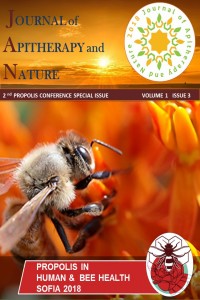Abstract
The clinical relevance of biofilms has become more apparent, however despite
this increased prominence they remain difficult to treat. Biofilm formation
relies on bacterial communication mechanisms known as quorum sensing (QS). QS
presents a novel target for antimicrobials. It is postulated that QS inhibition
would not so readily lead to the development of resistance, a common barrier in
the treatment of infectious disease. This study set out to establish whether
propolis could have an impact on biofilm formation.
Gram positive and negative bacterial species of clinical relevance were
tested, namely Staphylococcus aureus, Escherichia coli and Pseudomonas
aeruginosa. In addition, Chromobacterium violaceum was used to
determine QS inhibition. The effects of an ethanoic extraction of propolis
(0-2.5% v/v) on biofilm formation was assessed using colourimetry. Manuka honey was tested as a comparison due
to its known impact on biofilm formation and QS.
inhibit biofilm formation in all bacteria tested. Effects were similar in both
Gram positive and negative bacteria. Whilst Manuka honey also achieved an
inhibitory effect on biofilm formation, this was to a lesser extent. Propolis
was also found to be particularly potent at inhibiting QS in C. violaceum. Our
data demonstrates that propolis has potent anti-biofilm properties. These
properties are at least in part due to QS inhibition, which is shown by the inhibition
production of homoserine lactone in C. violaceum. This study
demonstrates the therapeutic potential of propolis in inhibiting biofilm
formation in a range of clinically relevant bacteria.
Keywords
References
- .
Abstract
References
- .
Details
| Primary Language | English |
|---|---|
| Journal Section | 2nd Propolis Conference Special Issue |
| Authors | |
| Publication Date | December 8, 2018 |
| Published in Issue | Year 2018 Volume: 1 Issue: 3 - 2nd Propolis Conference Special Issue |
Cite
- Google Akademik (Google Scholar)
- idealonline
- Directory of Research Journal Indexing (DRJI)
- Asos İndeks

